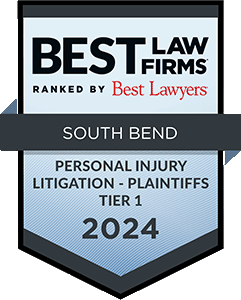 Medical bills are a common expense after a car accident. Because Indiana is a tort state, the at-fault driver and his or her insurance company will be responsible for covering your expenses. However, depending on the circumstances of your accident and injuries, there may be other options as well.
Medical bills are a common expense after a car accident. Because Indiana is a tort state, the at-fault driver and his or her insurance company will be responsible for covering your expenses. However, depending on the circumstances of your accident and injuries, there may be other options as well.
This process can be complicated, so it is important to contact a South Bend car accident attorney for help if you have been involved in a car accident. Contact our law firm today for a free case evaluation.
The At-Fault Driver’s Auto Insurance
Drivers are required to maintain auto insurance in the state of Indiana to cover the injuries and property damage they may cause in an accident. Drivers must carry at least:
- $25,000 for bodily injury liability per injured person
- $50,000 for total bodily injury liability per accident
- $50,000 for property damage
Your Medical Payments Insurance
If you chose to include medical payments insurance on your policy, you can use it to help cover your medical bills after an accident up to your policy limits regardless of who was at fault. This can also help cover out-of-pocket expenses, such as deductibles and co-pays.
Medical payments coverage is beneficial because it pays for your medical expenses as they happen, rather than in one lump sum from the insurance company once your treatment and care has concluded.
Uninsured/Underinsured Motorist Coverage
Indiana auto insurance policies automatically include uninsured/underinsured motorist coverage, although a policyholder can opt out of this coverage by writing to his or her insurance company. If you have been in an accident where the other driver was at fault, but he or she does not have auto insurance or not enough coverage, then your uninsured/underinsured motorist coverage will help cover your bills from the crash.
The minimum coverage amounts are:
- Uninsured motorist: $25,000 for bodily injury liability per injured person
- Uninsured motorist: $50,000 for total bodily injury liability per accident
- Uninsured motorist: $25,000 for property damage
- Underinsured motorist: $50,000 for total bodily injury per accident
If you hold underinsured motorist coverage, it kicks in after the at-fault party’s insurance maxes out, if applicable. For example, if you have $100,000 of medical bills and the other party’s insurance maximum is $70,000, your coverage will pay the $30,000 difference up to your policy limits.
Indiana had the eighth-highest percentage of uninsured motorists in the U.S. in 2015, so this coverage is important.
Your Health Insurance
If all other options have been exhausted, your health insurance may help cover the cost of your medical bills. However, most health insurance companies require that they be reimbursed for your medical bills from your settlement with the auto insurance company.
Need Help With a Claim?
Some drivers carry the minimum amount of coverage, and others carry excellent coverage. Regardless of the coverage, you cannot count on the insurance company to send a check over for everything you need. That is why it is so important to hire a seasoned attorney to be on your side.
Insurance companies want to pay the bare minimum, but a lawyer will fight for you and help you get everything you are owed, both from the other party’s insurance and your own policy. The personal injury attorneys at Pfeifer, Morgan & Stesiak are ready to help you get the maximum compensation owed to you after an accident.
It’s easy to get started. Call (844) 678-1800 today.











